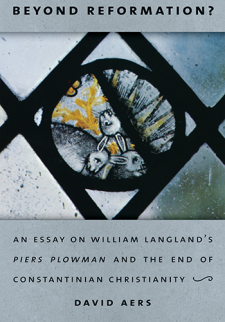Beyond Reformation? An Essay on Langland's "Piers Plowman" and the End of Constantinian Christianity
David Aers
2015
University of Notre Dame Press

David Aers, James B. Duke Professor of English and Historical Theology, presents a sustained and profound close reading of the final version of William Langland’s "Piers Plowman," the most searching Christian poem of the Middle Ages in English. His reading, most unusually, seeks to explore the relations of Langland’s poem to both medieval and early modern reformations together with the ending of Constantinian Christianity.
Aers concentrates on Langland’s extraordinarily rich ecclesiastic politics and on his account of Christian virtues and the struggles of Conscience to discern how to go on in his often baffling culture. The poem’s complex allegory engages with most institutions and forms of life. In doing so, it explores moral languages and their relations to current practices and social tendencies. Langland’s vision conveys a strange sense that in his historical moment some moral concepts were being transformed and some traditions the author cherished were becoming unintelligible. Ayers seeks to show how Langland grasped subtle shifts that were difficult to discern in the fourteenth century but were to become forces with a powerful future in shaping Western Christianity.
